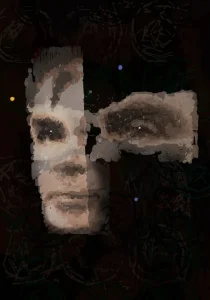AI-created artwork hits auction block: Sotheby’s is set to make history by auctioning the first artwork created by a humanoid robot using artificial intelligence algorithms.
- The piece, titled “A.I. God. Portrait of Alan Turing” (2024), was created by the humanoid robot artist Ai-Da and will be sold on October 31.
- The 64-inch by 90-inch mixed media canvas portrait of mathematician and computer scientist Alan Turing has an estimate of $120,000 to $180,000, with a third-party guarantee.

The artist behind the machine: Ai-Da, the humanoid robot responsible for creating the artwork, represents a unique intersection of robotics and artificial intelligence in the art world.
- Ai-Da was created by U.K.-based art dealer and gallery owner Aidan Meller.
- The robot is depicted as a woman with a black bob, dressed in a t-shirt and denim overalls.
- Ai-Da creates art using a combination of cameras in its eyes, AI algorithms, and a robotic arm for drawing and painting.
Significance of the auction: The sale of “A.I. God. Portrait of Alan Turing” marks a milestone in the evolving landscape of AI-generated art and its recognition in the traditional art market.
- This is the first time a work created by a humanoid robot of this type has come to auction.
- The sale highlights the growing influence and potential of AI in various fields, including the arts.
- Proceeds from the sale will be reinvested in the Ai-Da project, which is costly to maintain and develop.
Market reception and valuation: Despite the novelty of AI-generated art, there appears to be significant interest from collectors in this emerging field.
- Michael Bouhanna, Sotheby’s vice president and head of digital art, noted strong demand for the piece based on conversations with prominent collectors at the intersection of art and technology.
- The pre-sale estimate reflects the anticipated desirability and market potential of the artwork within the AI art space.
Exhibition history and context: The artwork has already gained recognition in international forums, showcasing its relevance to ongoing discussions about AI and technology.
- “A.I. God. Portrait of Alan Turing” was exhibited at the AI for Good Global Summit at the United Nations in Geneva, Switzerland in May 2024.
- The portrait was displayed as part of a five-paneled Polyptych, further emphasizing its artistic and conceptual significance.
Broader implications for the art world: The auction of Ai-Da’s creation signals a potential shift in how the art market perceives and values AI-generated works.
- The sale could pave the way for increased acceptance and recognition of AI-created art in traditional auction houses and galleries.
- It raises questions about authorship, creativity, and the role of technology in artistic expression.
Looking ahead: The October 31 digital art sale at Sotheby’s will feature works by other notable digital artists alongside Ai-Da’s creation.
- The auction will include pieces by Refik Anadol, PAK, Xcopy, and DesLucrece, among others.
- This diverse lineup suggests a growing market for digital and AI-influenced art, potentially reshaping the landscape of contemporary art collecting.
Analyzing deeper: While the auction of Ai-Da’s work marks a significant moment in the art world, it also prompts important questions about the nature of creativity and the future of human-AI collaboration in artistic endeavors. As AI continues to advance, the art community will need to grapple with issues of authenticity, originality, and the evolving definition of what constitutes “art” in an increasingly technology-driven world.
Recent Stories
DOE fusion roadmap targets 2030s commercial deployment as AI drives $9B investment
The Department of Energy has released a new roadmap targeting commercial-scale fusion power deployment by the mid-2030s, though the plan lacks specific funding commitments and relies on scientific breakthroughs that have eluded researchers for decades. The strategy emphasizes public-private partnerships and positions AI as both a research tool and motivation for developing fusion energy to meet data centers' growing electricity demands. The big picture: The DOE's roadmap aims to "deliver the public infrastructure that supports the fusion private sector scale up in the 2030s," but acknowledges it cannot commit to specific funding levels and remains subject to Congressional appropriations. Why...
Oct 17, 2025Tying it all together: Credo’s purple cables power the $4B AI data center boom
Credo, a Silicon Valley semiconductor company specializing in data center cables and chips, has seen its stock price more than double this year to $143.61, following a 245% surge in 2024. The company's signature purple cables, which cost between $300-$500 each, have become essential infrastructure for AI data centers, positioning Credo to capitalize on the trillion-dollar AI infrastructure expansion as hyperscalers like Amazon, Microsoft, and Elon Musk's xAI rapidly build out massive computing facilities. What you should know: Credo's active electrical cables (AECs) are becoming indispensable for connecting the massive GPU clusters required for AI training and inference. The company...
Oct 17, 2025Vatican launches Latin American AI network for human development
The Vatican hosted a two-day conference bringing together 50 global experts to explore how artificial intelligence can advance peace, social justice, and human development. The event launched the Latin American AI Network for Integral Human Development and established principles for ethical AI governance that prioritize human dignity over technological advancement. What you should know: The Pontifical Academy of Social Sciences, the Vatican's research body for social issues, organized the "Digital Rerum Novarum" conference on October 16-17, combining academic research with practical AI applications. Participants included leading experts from MIT, Microsoft, Columbia University, the UN, and major European institutions. The conference...
